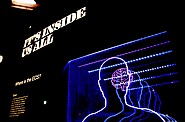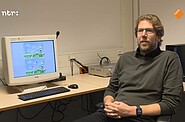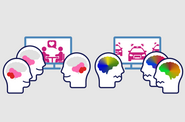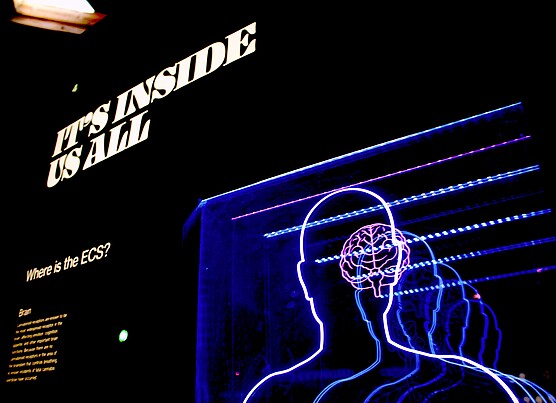Profile
I have a broad interest in human behaviour and in how the brain orchestrates this behaviour. My current research topics range from the decoding of psychological processes from the brain, to investigating brain responses with naturalistic stimuli (movies), to the neural underpinnings of cheating and deception. I will briefly outline these research lines below.
Cheating, unfairness and deception
Dishonest behaviour, such as tax evasion, music piracy or fraud, is highly prevalent in our society and inflicts huge economic costs. Every day, we are faced with the conflict between the temptation to cheat and deceive for financial gains and maintaining a positive image of ourselves as being a ‘good person’. In this line of research, we investigate the psychological and neural underpinnings of decisions to either cheat and deceive, or to remain fair and honest. We find that particularly individual differences in the engagement of cognitive control and theory of mind drive decisions to be fair and honest (or not). For example, in one study we found that cognitive control may override an individual’s moral default, allowing honest people to cheat, whereas it enables cheaters to be honest. These insights contribute to a deeper understanding of individual differences in honesty and may aid in developing more targeted interventions aiming at reducing dishonesty.
Brains at the movies
In the past, research in neuroscience has used decontextualized stimuli and highly artificial experimental designs to study the neural substrate of cognitive processes. Although this approach has been very successful, as it allows for tightly controlled experiments and straightforward interpretation of results, it has left open the question of how the brain responds to events in more naturalistic settings. In this line of research, we address this issue by investigating how brain processes unfold during movie watching. We find that we can track emotions, engagement and preference that follow the narrative of the presented videos. In addition, we observe that we can not only predict how well individual participants will like the movie they are watching, but also how well others will like this movie. That is, we can predict, from brain activity measured during movie-watching in a small set of participants, to what extent a different set of participants will like this movie, and even estimate how well the movie will do at the box office.
Decoding psychological processes from the brain
The human psyche pretty much remains a black box: we can observe or even manipulate the input a person’s psychological system receives, but not the feelings or cognitive processes that are evoked by this input. Likewise, we can observe the decisions made by the system, but not the feelings or cognitive processes that drove these decisions. In this line of research, we decode these latent processes or states from the brain, using machine learning methods applied to distributed pattern of brain activity. For example, in two studies (one using EEG, and one using fMRI), we presented participants with video content while measuring activity from their brains. Using machine learning, we trained classifiers to accurately decode the emotional experience evoked by these videos in our participants. As another example, in every-day life we observe large differences in honesty and fairness across individuals. In a set of two studies (using fMRI), we decode idiosyncrasies in the underlying motivations for honesty and fairness. We find that particularly individual differences in the engagement of cognitive control and theory of mind drive differences in prosocial behaviour.
Publications
Highlighted (3)
-
Speer, S. P. H., Smidts, A., & Boksem, M. A. S. (2022). Cognitive control and dishonesty. Trends in Cognitive Sciences, 26(9), 796 - 808. https://doi.org/10.1016/j.tics.2022.06.005
-
Speer, S. P., Smidts, A., & Boksem, M. A. S. (2021). Cognitive control promotes either honesty or dishonesty, depending on one's moral default. Journal of Neuroscience, 41(42), 8815-8825. https://doi.org/10.1523/jneurosci.0666-21.2021
-
Speer, S., Smidts, A., & Boksem, M. (2020). Cognitive control increases honesty in cheaters but cheating in those who are honest. Proceedings of the National Academy of Sciences of the U.S.A., 117(32), 19080-19091. https://doi.org/10.1073/pnas.2003480117
Article (24)
Academic (23)
-
Boksem, M., van Diepen, R., Eijlers, E., Boekel, W., & Smidts, A. (2025). Do EEG metrics derived from trailers predict the commercial success of movies? A systematic analysis of five independent datasets. Journal of Marketing Research, 62(4), 703-720. https://doi.org/10.1177/00222437241309875
-
van Diepen, R., Boksem, M., & Smidts, A. (2025). Reliability of EEG metrics for assessing video advertisements. Journal of Advertising, 54(4), 506-526. https://doi.org/10.1080/00913367.2024.2418109
-
Chan, H.-Y., Boksem, M., Venkratraman, V., Dietvorst, RC., Scholz, C., Vo, K., Falk, E. B., & Smidts, A. (2024). Neural signals of video advertisement liking: Insights into psychological processes and their temporal dynamics. Journal of Marketing Research, 61(5), 891-913. https://doi.org/10.1177/00222437231194319
-
van Brussel, L., Boksem, M., Dietvorst, RC., & Smidts, A. (2024). Brain activity of professional investors signals future stock performance. Proceedings of the National Academy of Sciences of the United States of America, 121(16), e2307982121. Article e2307982121. https://doi.org/10.1073/pnas.2307982121
-
Speer, S. P. H., Keysers, C., Barrios, J. C., Teurlings, C. J. S., Smidts, A., Boksem, M. A. S., Wager, T. D., & Gazzola, V. (2023). A multivariate brain signature for reward. NeuroImage, 271, Article 119990. https://doi.org/10.1016/j.neuroimage.2023.119990
-
Speer, S., Martinovici, A., Smidts, A., & Boksem, M. (2023). The acute effects of stress on dishonesty are moderated by individual differences in moral default. Scientific Reports, 13(1), Article 3984. https://doi.org/10.1038/s41598-023-31056-2
-
Zhang, C., Beste, C., Prochazkova, L., Wang, K., Speer, S. P. H., Smidts, A., Boksem, M. A. S., & Hommel, B. (2022). Resting-state BOLD signal variability is associated with individual differences in metacontrol. Scientific Reports, 12(1), Article 18425. https://doi.org/10.1038/s41598-022-21703-5
-
Speer, S. P. H., Smidts, A., & Boksem, M. A. S. (2022). Cognitive control and dishonesty. Trends in Cognitive Sciences, 26(9), 796 - 808. https://doi.org/10.1016/j.tics.2022.06.005
-
Speer, S. P. H., Smidts, A., & Boksem, M. A. S. (2022). Individual differences in (dis)honesty are represented in the brain's functional connectivity at rest. NeuroImage, 246, Article 118761. https://doi.org/10.1016/j.neuroimage.2021.118761
-
Speer, S. P., Smidts, A., & Boksem, M. A. S. (2021). Cognitive control promotes either honesty or dishonesty, depending on one's moral default. Journal of Neuroscience, 41(42), 8815-8825. https://doi.org/10.1523/jneurosci.0666-21.2021
-
Speer, S., Smidts, A., & Boksem, M. A. S. (2021). Different neural mechanisms underlie non-habitual honesty and non-habitual cheating. Frontiers in Neuroscience, 15. https://doi.org/10.3389/fnins.2021.610429
-
Speer, S., Smidts, A., & Boksem, M. (2020). Cognitive control increases honesty in cheaters but cheating in those who are honest. Proceedings of the National Academy of Sciences of the U.S.A., 117(32), 19080-19091. https://doi.org/10.1073/pnas.2003480117
-
Eijlers, E., Boksem, M., & Smidts, A. (2020). Measuring neural arousal for advertisements and its relationship with advertising success. Frontiers in Neuroscience, 14(736). https://doi.org/10.3389/fnins.2020.00736
-
Couwenberg, L., Boksem, M., Sanfey, AG., & Smidts, A. (2020). Neural mechanisms of choice diversification. Frontiers in Neuroscience, 14, 502. https://doi.org/10.3389/fnins.2020.00502
-
Chan, H., Smidts, A., Schoots, V., Sanfey, AG., & Boksem, M. (2020). Decoding dynamic affective responses to naturalistic videos with shared neural patterns. NeuroImage, 216. https://doi.org/10.1016/j.neuroimage.2020.116618
-
Speer, S., & Boksem, M. (2019). Decoding fairness motivations from multivariate brainactivity patterns. Social Cognitive and Affective Neuroscience, 14(11), 1197–1207. https://doi.org/10.1093/scan/nsz097
-
Eijlers, E., Smidts, A., & Boksem, M. (2019). Implicit measurement of emotional experience and its dynamics. PLoS One (online), 14(2), Article e0211496. https://doi.org/10.1371/journal.pone.0211496
-
Chan, H., Smidts, A., Schoots, V., Dietvorst, RC., & Boksem, M. (2019). Neural similarity at temporal pole and cerebellum predicts out-of-sample preference and recall for video stimuli. NeuroImage, 197, 391-401. https://doi.org/10.1016/j.neuroimage.2019.04.076
-
Chan, H., Boksem, M., & Smidts, A. (2018). Neural profiling of brands: Mapping brand image in consumers' brains with visual templates. Journal of Marketing Research, 55(4), 600-615. https://doi.org/10.1509/jmr.17.0019
-
Couwenberg, L., Boksem, M., Dietvorst, RC., Worm, L., Verbeke, W., & Smidts, A. (2017). Neural Responses to Functional and Experiential Ad Appeals: Explaining Ad Effectiveness. International Journal of Research in Marketing, 34(2), 355-366. https://doi.org/10.1016/j.ijresmar.2016.10.005
-
Boksem, M., & Smidts, A. (2015). Brain responses to movietrailers predict individual preferences for movies and their population-wide commercial success. Journal of Marketing Research, 52(4), 482-492. https://doi.org/10.1509/jmr.13.0572
-
Smidts, A., Hsu, M., Sanfey, AG., Boksem, M., Ebstein, RB., Huettel, SA., Kable, JW., Karmarkar, UM., Kitayama, S., Liberzon, I., Knutson, B., Lohrenz, T., Stallen, M., & Yoon, C. (2014). Advancing Consumer Neuroscience. Marketing Letters, 25(3), 257-267. https://doi.org/10.1007/s11002-014-9306-1
-
Boksem, M., Mehta, PH., Van den Bergh, B., van Son, V., Trautmann, ST., Roelofs, K., Smidts, A., & Sanfey, AG. (2013). Testosterone Inhibits Trust but Promotes Reciprocity. Psychological Science, 24(11), 2306-2314. https://doi.org/10.1177/0956797613495063
Professional (1)
-
Boksem, M., & Smidts, A. (2016). Voorspelt EEG filmsucces? Psychologische processen in het brein. Tijdschrift voor Marketing, (Maart), 44-47.
Chapter (5)
Academic (1)
-
Genevsky, A., & Boksem, M. (Accepted/In press). Applications in Consumer Neuroscience: Decoding and Neuroforecasting. In Neuroeconomics: Core Topics and Current Directions Springer Nature. https://papers.ssrn.com/sol3/papers.cfm?abstract_id=5001469
Professional (4)
-
Smidts, A., & Boksem, M. A. S. (2021). Neuromarketing: Wat is het en wat kunnen we ermee? In Y. M. Van Everdingen (Ed.), Tools for capturing information to improve business insights: MOA Topic of the Year 2021 (pp. 12-22). MOA, Expertise Center voor Marketing-insights, Onderzoek & Analytics.
-
Eijlers, E., Smidts, A., & Boksem, M. (2020). Implicit measurement of emotional experience and its dynamics. In Neuromarketing Yearbook 2020 NMSBA.
-
Chan, H., Boksem, M., & Smidts, A. (2019). Neural profiling of brands: Mapping brand image in consumers' brains with visual templates. In Neuromarketing Yearbook 2019 NMSBA.
-
Boksem, M., & Smidts, A. (2015). Your brain on movie trailers – How brain responses to movie trailers predict individual preferences for movies and their population-wide commercial success. In Neuromarketing Yearbook 2015 NMSBA.
Conference proceeding (1)
Academic (1)
-
Speer, S., & Boksem, M. (2020). Decoding fairness motivations from multivariate brain activity patterns. In Social Cognitive and Affective Neuroscience Oxford University Press. https://doi.org/10.1093/scan/nsz097
Web publication/site (7)
Professional (7)
-
Speer, S., Smidts, A., & Boksem, M. (2020). Why honest people cheat. Web publication/site, RSM Discovery.
-
Speer, S., & Boksem, M. (2020). How brain measures can help to understand fairness. Web publication/site, RSM Discovery.
-
Chan, H., Boksem, M., & Smidts, A. (2019). All in the mind? How neuroscience can help measure the emotional impact of brand image and video engagement. Web publication/site
-
Chan, H., Smidts, A., & Boksem, M. (2019). Brain scans reveal engagement levels of videos. Web publication/site, RSM Discovery.
-
Eijlers, E., Smidts, A., & Boksem, M. (2019). Tracking emotions real time in the brain. Web publication/site, RSM Discovery.
-
Chan, H., Boksem, M., & Smidts, A. (2018). Identifying strong brands in the brain. Web publication/site, RSM Discovery.
-
Couwenberg, L., Boksem, M., & Smidts, A. (2017). Brain scans reveal what makes a TV advert effective. Web publication/site, RSM Discovery.
Award
- Fellowship - ERIM early career talent programme (2010)
Courses
Neuroeconomics
- Study year: 2025/2026, 2024/2025, 2023/2024
- Code: B3MIN1018
Neuromarketing
- Study year: 2025/2026, 2024/2025, 2023/2024
- Code: BMME057
Topics in Marketing Research B
- Study year: 2025/2026
- Code: BERMASC055
Past courses
Consumer Behavior
- Study year: 2023/2024
- Code: BERMASC039
Featured in the media
-
Brain activity of professional investors signals future stock performance
RSM's Leo van Brussel's work appears in the Proceedings of the National Academy of Sciences: emerging “neuroforecasting” research suggests that brain activity associated with anticipatory reward relates to market behavior and…
Wednesday, 1 May 2024 -
Brain activity of professional investors signals future stock performance.
Emerging "neuroforecasting" research suggests that brain activity associated with anticipatory reward relates to market behavior and population-wide preferences, including stock price dynamic
Tuesday, 9 April 2024 -
The acute effects of stress on dishonesty are moderated by individual differences in moral default
The effects of individual predisposition on dishonesty
Thursday, 9 March 2023 -
It's only a game: why one takes losing better than another
Understanding the Science of Coping with Game Loss and the Complexities of Cheating Behavior
Thursday, 24 November 2022 -
Resting-state BOLD signal variability is associated with individual differences in metacontrol
Understanding the Neural Basis of Cognitive Control
Tuesday, 1 November 2022 -
It turns out even honest people cheat
An article about the relation between the honesty of people and their willingness to cheat. It quotes a new research RSM, revealing that willpower, (aka “cognitive control” in psychology speak), does not serve the same purpose for…
Sunday, 6 September 2020 -
ALL IN THE MIND?
Wednesday, 4 December 2019 -
Hersenscans laten zien of een video ons boeit
Ale Smidts, Maarten Boksem and Hang-Yee Chan have measured how our brains respond to TV commercials. It appears that the brains of different people react identically when they see exciting videos, according to their research.…
Wednesday, 28 August 2019 -
WAAROM WE BEPAALDE FILMPJES BOEIEND VINDEN
If we find a trailer or an advertisement fascinating, then our brains show the same pattern, according to researchers from RSM. We are mainly stimulated in the brain areas that are associated with the processing of emotions and…
Tuesday, 27 August 2019 -
Hersenonderzoek: een emotioneel filmpje mét een verhaal boeit het meest
Ale Smidts, Maarten Boksem and Hang-Yee Chan have measured how our brains respond to TV commercials. It appears that the brains of different people react identically when they see exciting videos, according to their research.…
Tuesday, 27 August 2019 -
[Onderzoek] Hersenscans laten zien of een video ons boeit
Ale Smidts, Maarten Boksem and Hang-Yee Chan have measured how our brains respond to TV commercials. It appears that the brains of different people react identically when they see exciting videos, according to their research.…
Tuesday, 27 August 2019 -
[Onderzoek] Boeiende video genereert vergelijkbare reacties in de hersenen
Research conducted by Maarten Boksem, Ale Smidts and Hang-Yee Chang regarding emotional storytelling has been mentioned in an article.
Tuesday, 27 August 2019 -
Hersenscans tonen aan of een video ons boeit
Research regarding emotional storytelling conducted by Ale Smidts, Maarten Boksem and Hang-Yee Chan has been mentioned in an article. Their research indicated that brain activity of different people is often identical when they…
Tuesday, 27 August 2019 -
Using AI to Track Emotional Experiences
An article that discusses new research conducted by Esther Eijlers, Maarten Boksem and Ale Smidts of RSM into Artificial Intelligence, more specifically on how human emotions may be tracked and measured. The innovative new method…
Monday, 22 July 2019 -
[Onderzoek] ‘Erasmus University (RSM) heeft een algoritme ontwikkeld om emotionele ervaringen van klanten te meten’
An article that discusses new research conducted by Esther Eijlers, Maarten Boksem and Ale Smidts of RSM into Artificial Intelligence, more specifically on how human emotions may be tracked and measured. The innovative new method…
Thursday, 18 July 2019 -
USING AI TO TRACK EMOTIONAL EXPERIENCES
An article that discusses the research conducted by Esther Eijlers, Maarten Boksem and Ale Smidts of RSM suggesting that AI may be used to track emotional experiences.
Wednesday, 10 July 2019 -
Emotionele ervaringen van klanten meten met EEG
An article that discusses new research conducted by Esther Eijlers, Maarten Boksem and Ale Smidts of RSM into Artificial Intelligence, more specifically on how human emotions may be tracked and measured. The innovative new method…
Wednesday, 3 July 2019 -
Wetenschappers RSM Erasmus ontwikkelen EEG-emotie-meter
An article that discusses new research conducted by Esther Eijlers, Maarten Boksem and Ale Smidts of RSM into Artificial Intelligence, more specifically on how human emotions may be tracked and measured. The innovative new method…
Wednesday, 3 July 2019 -
Met 62 elektroden emoties meten voor betere reclameboodschappen
Esther Eijlers, Maarten Boksem and Ale Smidts from RSM say that they have now developed a new method that measure emotions in the brain in real time and monitored with the help of electroencephalography (EEG). According to the…
Wednesday, 3 July 2019 -
Inzicht krijgen in emoties met nieuwe EEG-methode
Ale Smidts, Maarten Boksem and Esther Eijlers of RSM have developed a method whereby emotions in the brain can be measured directly with the help of EEG. This method is discussed in the article
Tuesday, 2 July 2019 -
Meekijken in het hoofd van de consument: het kan nu
An article that discusses new research conducted by Esther Eijlers, Maarten Boksem and Ale Smidts of RSM into Artificial Intelligence, more specifically on how human emotions may be tracked and measured. The innovative new method…
Tuesday, 2 July 2019 -
[Onderzoek] Emotionele ervaringen van klanten meten met EEG
An article that discusses new research conducted by Esther Eijlers, Maarten Boksem and Ale Smidts of RSM into Artificial Intelligence, more specifically on how human emotions may be tracked and measured. The innovative new method…
Tuesday, 2 July 2019 -
EMOTIES VOORSPELLEN MET ALGORITME VAN HERSENSIGNALEN
An article that discusses research conducted by Ale Smidts, Maarten Boksem and Esther Eijlers of RSM on EEG.
Tuesday, 2 July 2019 -
Machine learning technology allows us to track emotional experiences
An article that discusses new research conducted by Esther Eijlers, Maarten Boksem and Ale Smidts of RSM into Artificial Intelligence, more specifically on how human emotions may be tracked and measured. The innovative new method…
Friday, 31 May 2019 -
Machine learning technology allows us to track emotional experiences
Human emotions can now be tracked and measured, according to research from RSM. Developed by Ester Eijlers, Maarten Boksem and Ale Smidts of RSM, the innovative new method uses electroencephalography (EEG) to chart emotional…
Friday, 31 May 2019 -
Machine learning could soon be capable of tracking human emotion
It may now be possible to utilise machine learning to successfully track how someone feels. Researchers from RSM have developed a new method to track and measure emotions in the brain using electroencephalography (EEG), a way of…
Wednesday, 29 May 2019 -
8 nieuwe wetenschappelijke inzichten voor je (e-mail)marketing
The SWOCC symposium presents researches studying the basic operation of commercial communications. One of the presenters is Maarten Boksem studying brain activity patterns explicitly associated with emotions, which of course…
Friday, 8 July 2016 -
Voorspelt EEG filmsucces?
The research of Maarten Boksem and Ale Smidts regarding neuroimaging technologies, such as EEG machines can reveal information that is not obtainable through conventional marketing surveys. How well could these results predict the…
Thursday, 31 March 2016
Featured on RSM Discovery
RSM study finds brain activity of professional investors predicts future stock performance, highlighting neuroforecasting potential.
Maarten Boksem, an associate professor in Marketing, was interviewed about the recent scandal in the chess world regarding cheating.










